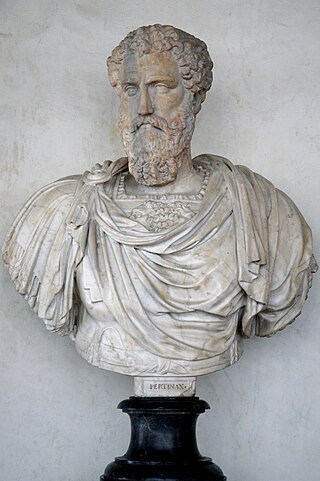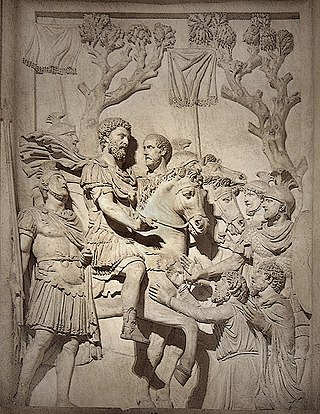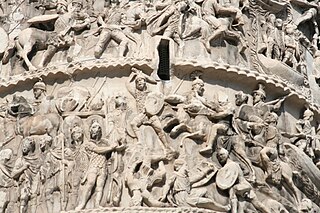Related Research Articles

Lucius Septimius Severus was Roman emperor from 193 to 211. He was born in Leptis Magna in the Roman province of Africa. As a young man he advanced through the customary succession of offices under the reigns of Marcus Aurelius and Commodus. Severus was the final contender to seize power after the death of the emperor Pertinax in 193 during the Year of the Five Emperors.
The 180s decade ran from January 1, 180, to December 31, 189.

Commodus was a Roman emperor who ruled from 177 until his assassination in 192. For the first three years of his reign, he was co-emperor with his father Marcus Aurelius. Commodus's sole rule, starting with the death of Marcus in 180, is commonly thought to mark the end of a golden age of peace and prosperity in the history of the Roman Empire.

Publius Helvius Pertinax was Roman emperor for the first three months of 193. He succeeded Commodus to become the first emperor during the tumultuous Year of the Five Emperors.

Marcus Didius Julianus was Roman emperor from March to June 193, during the Year of the Five Emperors. Julianus had a promising political career, governing several provinces, including Dalmatia and Germania Inferior, and defeated the Chauci and Chatti, two invading Germanic tribes. He was even appointed to the consulship in 175 along with Pertinax as a reward, before being demoted by Commodus. After this demotion, his early, promising political career languished.

Tiberius Claudius Pompeianus was a politician and military commander during the 2nd century in the Roman Empire. A general under Emperor Marcus Aurelius, Pompeianus distinguished himself during Rome's wars against the Parthians and the Marcomanni. He was a member of the imperial family due to his marriage to Lucilla, a daughter of Marcus Aurelius, and was a key figure during the emperor's reign. Pompeianus was offered the imperial throne three times, though he refused to claim the title for himself.
Caerellius Priscus is the name given to the man on an inscription recovered at Mogontiacum (Mainz), set up by a governor of Germania Superior who was afterwards governor of Roman Britain in the late 170s.

The Marcomannic Wars were a series of wars lasting from about AD 166 until 180. These wars pitted the Roman Empire against principally the Germanic Marcomanni and Quadi and the Sarmatian Iazyges; there were related conflicts with several other Germanic, Sarmatian, and Gothic peoples along both sides of the whole length of the Roman Empire's northeastern European border, the river Danube.
Cornelius Repentinus was a Roman Senator who was active in the 2nd century AD. He held a number of positions during the reigns of emperors Marcus Aurelius, Commodus and Didius Julianus, which included suffect consul and Urban prefect of Rome.
Marcus Aurelius Cleander, commonly known as Cleander, was a Roman freedman who gained extraordinary power as chamberlain and favourite of the emperor Commodus, rising to command the Praetorian Guard and bringing the principal offices of the Roman state into disrepute by selling them to the highest bidder. His career is narrated by Dio Cassius, Herodian and the Historia Augusta.
Sextus Tigidius Perennis served as Praetorian Prefect under the Roman emperor Commodus. Perennis exercised an outsized influence over Commodus and was the effective ruler of the Roman Empire. In 185, Perennis was implicated in a plot to overthrow the emperor by his political rival, Marcus Aurelius Cleander, and executed on the orders of Commodus.
Publius Atilius Aebutianus was a prefect of the Roman imperial bodyguard, known as the Praetorian Guard, during the reign of emperor Commodus, from 185 until his death in 188. Aebutianus acceded to the office upon the execution of his predecessor Sextus Tigidius Perennis.
The gens Ceionia or gens Caeionia or the Caeionii family was an ancient Roman senatorial family of imperial times. The first member of the gens to obtain the consulship was Lucius Ceionius Commodus in AD 78. The rise of this family culminated in the elevation of the emperor Lucius Verus, born Lucius Ceionius Commodus, in AD 161.

Titus Flavius Piso was a Roman eques who held at least two senior postings during the reign of the Emperors Marcus Aurelius and Commodus.
Marcus Bassaeus Rufus was a Roman senator, who held a number of appointments during the reigns of the emperors Antoninus Pius, Marcus Aurelius and Commodus. The most notable of these were praefectus vigilum, praefectus or governor of Roman Egypt, and praetorian prefect.
Decimus Veturius Macrinus was a Roman eques who is known to have held imperial appointments under both emperors Commodus and Septimius Severus. He is best known for being governor of Roman Egypt under Commodus and praetorian prefect under Severus.
Titus Furius Victorinus was a Roman eques who held a number of appointments during the reigns of the Emperors Antoninus Pius and Marcus Aurelius. The most prominent of these offices were praefectus vigilum, praefectus or governor of Roman Egypt, and praetorian prefect.

Lucius Julius Vehilius Gratus Julianus was a soldier and an eques who held a number of military and civilian appointments during the reigns of Marcus Aurelius and his son Commodus. Julianus received honors two separate times for his military service.
The gens Tarrutenia or Tarutenia was an obscure plebeian family at ancient Rome. Only a few members of this gens are mentioned in history, but others are known from inscriptions. The most illustrious of the Tarrutenii was probably Publius Tarrutenius Paternus, a jurist of the late second century, who was praetorian prefect during the reign of Commodus.
The gens Tigidia was an obscure plebeian family at ancient Rome. The only member of this gens to appear in history was Sextus Tigidius Perennis, prefect of the praetorian guard early in the reign of Commodus, but others are known from inscriptions.
References
- ↑ His gentilicum has been written a number of different ways, including Tarruntenus, Tarrutienus and Tarruntenius, which haunt, in the words of Joerg Fuendling, "essays and monographs in an impossible number of spellings". (Review of Prosopographia Imperii Romani Saec. I. II. III. Pars viii, Fasciculus 1, Bryn Mawr Classical Review )
- ↑ Cassius Dio, Roman History, 73.5
- ↑ Dio, Roman History, 71.12
- ↑ Birley, Marcus Aurelius: A Biography, revised edition (London: Routledge, 1987), p. 171
- ↑ CIL VI, 41273
- ↑ AE 1971, 534
- ↑ Dio, Roman History, 72.5.2
- ↑ Historia Augusta, "Commodus", 4.1–10
- ↑ Birley, Septimus Severus: The African emperor, revised edition (New Haven: Yale, 1988), p. 61
- ↑ Roby, Henry John (1886). An Introduction to the Study of Justinian's Digest. Cambridge University Press. p. 186.